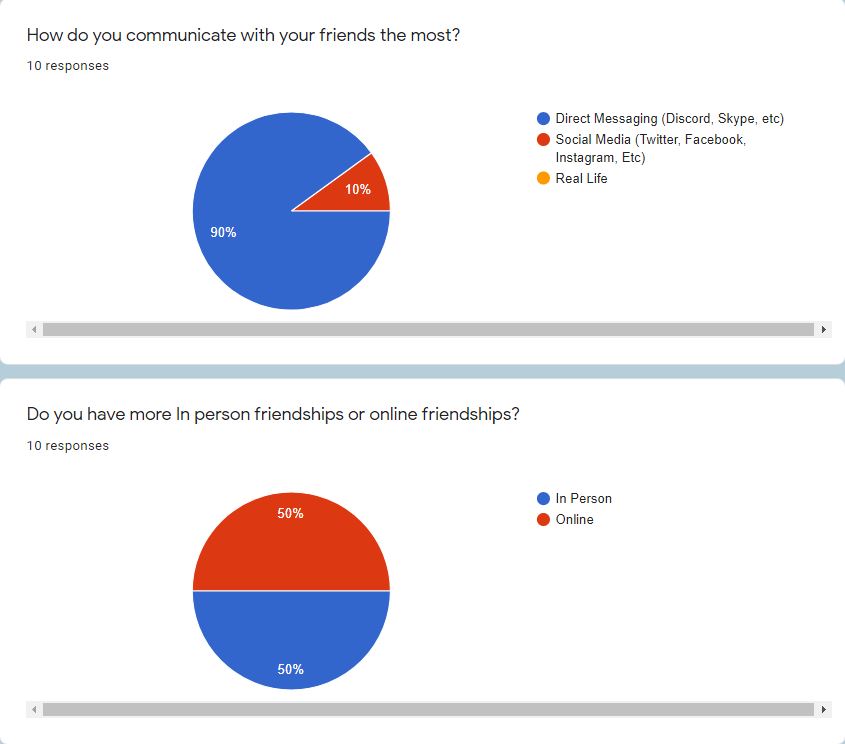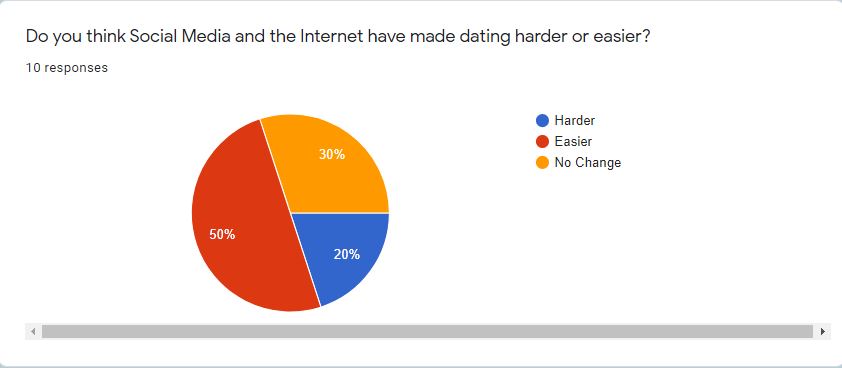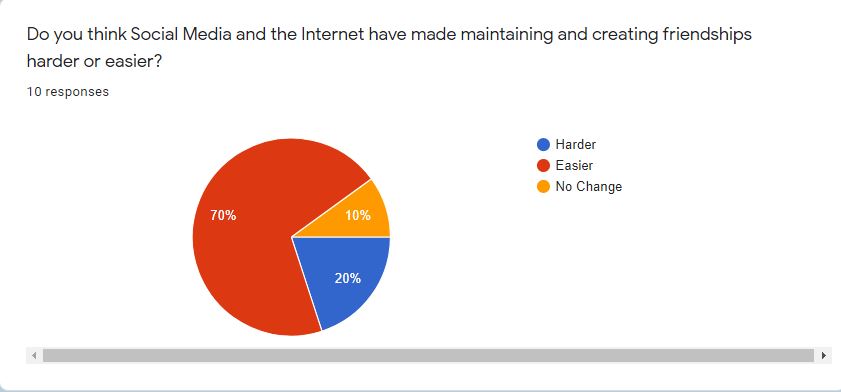Abstract
Humans are inherently social beings, no man is an island as the saying goes and the way we interact with each other has changed greatly over time and with the advancement of technology and modes of production, we have gone from the only way to contact people being face to face interactions, to sending letters, to mass organized mail systems to, telephones and now with the invention of the internet in the 80s communication has changed again and due to the medium of communication, the way we form relationships and maintain them have changed as well and the question being is how the internet has changed relationships? what are the positives or negatives? with the Internet evolving relationships we have seen major changes in the field of dating with the introduction of online dating (E-dating), sexting, message services, dating apps and have created easier access to communicating and meeting new people and with this their arrises positives such as ease of access and negatives such as online harassment and grooming. After conducting a survey the respondents seem to mostly agree that the internet has made positive changes but have also experienced the negatives of online relationships as well.
The History of Online Relationships
“Twenty years from now, the idea that someone looking for love won’t look for it online will be silly, akin to skipping the card catalog to instead wander the stacks because the right books are found only by accident.” This is a quote from Wired Magazine from 2002, doesn’t it seem odd that this quote seems to have held up so well? That almost twenty years later they seem to be mostly right, this quote which would have seemed ridiculous to a lot of people back then and surely to become as dated as the reference to the card catalog within it but the year is now 2022, and online dating services seem to be growing with reportedly 75 million active users monthly in 2021 on Tinder alone, Did Apollo hit Rufus Griscom with the gift of Prophecy? No probably not but in order to understand why this quote is so relevant we must have a cursory glance at the history of online dating.
Since before online dating there exist ways to meet others and gets dates that didn’t involve meeting people directly, in newspapers there existed such things called personals or personal ads which served as a way to find eligible partners by buying an ad and advertising themselves and explaining what they want out of a partner and how to contact them, usually males would seek female partners at least in the start but then turned into a safer way for gay people to meet discreetly back during the time that homosexuality was outlawed and even punishable by death. Personal Ads have existed since at least 1695 and have evolved since then from something that was looked at as shameful and deviant into something more socially acceptable and adopted broadly by the mid-1800s.
Later on, after the invention of the internet but before the creation of the first dating website, people would use chatrooms such as America Online (AOL) or Craigslist bulletin boards and classifieds to look for companionship but that all changed after the creation of Match.com in 1995 which served as the first online dating website and from there we would see the creation of OkCupid, Badoo and other major dating sites until the creation of Grindr in 2009 which was the first dating app designed for phones which would use your geographical location using your GPS from your phone to show you eligible people on your phone, something that would become mainstream among other dating apps which would quickly overtake dating websites as the next evolution and that would be cemented when Tinder, released in 2012, caused a massive surge in application to dating apps with its swipe based matching system introduced in 2013 that would streamline the matchmaking process.
Meeting and maintaining relationships online has become easier with the invention of messaging apps such as Skype in 2003 that allowed people to message and video call online which add a whole new degree of intimacy to both online friendships and online romantic/sexual relationships and this would only grow as new messaging apps popped up such as what is one of the most popular instant messaging app Discord in 2015, originally marketed towards gamers this audience quickly expanded to include a wide variety of people and has become famous as well as infamous for being used as a tool to date people online otherwise called E-dating, E-dating on discord can be harmless and can bring people together but could also and has in some cases resulted in cases of grooming, grooming being the act of usually a sexual predator using manipulation to lure victims to abuse, such as luring children into sexual positions such as sending sexual messages or nudes also referred to as sexting.
Currently, it is reported that online dating apps such as Tinder and the like, have become the most popular way that American couples meet according to a study by Stanford Sociologist Micheal Rosenfeld and states that 39% of heterosexual couples meet online and that makes the quote by Wired writer Rufus Griscom even more impressive, maybe Apollo did send the gift after all, and with Americans becoming more and more online and meeting people online more because of things such as the global pandemic of Covid-19 and the gradual shift towards being more and more online I want to figure out what effects the internet has on relationships either platonically or romantically and to find out how the internet has changed relationships.
Methods
I have decided to gauge reactions and see what people think of the effects of the internet in their personal lives I have composed a multiple choice anonymous survey, using google forms, of 9 questions and have gotten responses from 10 different people around the 18 to 21 age groups, I made sure to let them know that the survey was optional and also of the contents within the survey such as warnings about Relationships, online dating, online grooming and such along with this message attached to the survey “Answer to what you feel comfortable with and it’s okay if you’ve never been in an online relationship either romantically or platonically, any answers are fine and useful and thank you for your participation in this survey.” The questions asked in the survey are as follows:
- How do you communicate with your friends the most?
-
- Direct Messaging (Discord, Skype, etc)
- Social Media (Twitter, Facebook, Instagram, Etc)
- Real Life
- Other
- Do you have more In person friendships or online friendships?
- Do you value your online friendships as much as your irl Friendships? (“IRL”standing for “In Real Life”)
- Do you think Social Media and the Internet have made dating harder or easier?
-
- Harder
- Easier
- No Change
- Have you ever had a romantic or sexual relationship online?
- Have you ever participated in sexting?
- Do you think Long Distance Relationships are healthy?
- have you known anyone online who has experienced or witnessed grooming online (someone being groomed by someone on the internet)
- Do you think Social Media and the Internet have made maintaining and creating friendships harder or easier?
-
- Harder
- Easier
- No Change
Results
For Question #1 90% of people answered direct messaging services like Discord or Skype versus the 10% that said Social Media and the 0% that said real life, this could be due to a bunch of factors most likely a big one being the Covid-19 pandemic. Question #2 saw a 50/50 split among in-person and online as shown in Fig 1. For question #3 we have 90% saying they value their online friendships equally as their face to face friendships versus the 10% that say they don’t. Question #4 we see more of a split with 50% saying the internet has made dating easier, 20% saying harder and 30% saying they see no difference see fig 2. Question #5 is 80% no while question #6 is 70% no. Question #7 70% of people answer yes and question #8 70% answer yes to having experience with online grooming. The final question people overwhelmingly say that the internet has made friendships easier by 70% while 20% say harder and 10% saying that the internet has not changed it, see fig 3.

Figure 1. Results of questions 1 and 2, Screenshot by Jose David Rosas Alavez

Figure 2. People seem to be in favor of how the internet has changed dating, Screenshot by Jose David Rosas Alavez

Figure 3. People overwhelmingly agree that friendships are easier with the internet, Screenshot by Jose David Rosas Alavez
The Positives
We are seeing from these results and in real life put into practice that people seem to have a generally positive view of technologies relation and evolution of relationships, with the internet people seem to agree for the most part that maintaining friendships and making them are easier than before, which is easy to see due to messaging services like Skype and Discord allowing people to join servers and create servers in order to talk to friends and in the case of Discord specifically, join communities based around certain common shared interests like a specific video game, genre of music, celebrity and etc. These changes are seen as positive and the majority of people value these connections just as much as their face to face connections in their lives which is also a testament to the efficiency and evolution of how relationships are made on the internet, that we can develop personal attachment without physical interaction, usually through text, voice, and video.
Dating is also being said to have increased in ease, with more people saying romantic and sexual relationships have been made easier through the internet and especially mobile dating apps like Tinder, Hinge, and etc, this is reflected in a study “we find that total matches increase by 21.2% per week for males and by 64% per week for females. This suggests that there are significant differences in engagement through viewing, messaging, and matching outcomes that are induced by adopting the mobile app” this is dramatically increasing people’s accessibility to the world of dating and making it easier for people who are lonely who can’t rely on being set up with someone at their job, or friend, the internet gives them the ability to match and create a relationship which is especially good during a period of staying inside like now with the covid pandemic making meeting new people increasingly rare. This is also helpful for people with problems socializing to potentially meet people and form relationships “people with lower self-esteem may also be more likely to use online dating sites as lower self-esteem individuals might view online dating sites as a safer place to look for and to try to attract a potential romantic partner.” this makes the internet a safer way for these people to make friendships and romantic relationships, due to the perceived threat of rejection being lower which is also mentioned in the same article “In addition, people more sensitive to rejection may feel more comfortable trying to meet potential romantic partners in an online environment because it might be easier to avoid potential rejection in online dating environments than it is in other more traditional dating environments.” all of these things are good and positive changes made to how we manage and form relationships but along with the positives, there are also unintended consequences to this ease of accessibility and ease of communication on the internet which reveal a darker issue.
The Negatives
It would be great if we managed to live in a world where no one abused of anybody’s trust and we could live without the threat of malicious action but unfortunately, we do not live in that world and for exactly that reason we have age restrictions on certain things children can’t handle and try to protect children on the internet to some extent but what where the issue arises is when often time these protections are not enough. The concept of sexting is not something that is an inherently negative thing, it’s something people do in relationships especially online relationships because for couples that have no ability to interact physically sometimes this is the only option while still maintaining that relationship and the needs of each participant in that relationship, this is something adults do and as recent studies have shown, it is something that adolescent youths have begun partaking in more and more and with this comes unforeseen consequences that could harm them, this can take shape in a multitude of ways, often we see people who send sexts have them shared around to other’s without their consent, this can be done for malicious reasons and is often classified as revenge porn and can lead to embarrassment for the sender and other consequences because someone else decided to abuse their trust, this can also result with people feeling pressured into doing something they don’t want “Respondents also noted that some girls might engage in sexting out of the fear of losing a boyfriend or not being able to start a romantic relationship with boys they like.” all of these are consequences that can occur between two people of the same age but where it gets even worse is when an adult abuses the trust of a minor and participates in grooming them, something that happens far too often, as the results show in the study I conducted, 70% of people who took the survey has seen experienced or witness an act of grooming happening ot someone they know. With the ease of access to finding new people and many websites lax rules on age limits and no real verifiable way to prove someone’s age, children can gain access to places like Discord to talk to friends and even when they do reach the age to be able to join Discord and not violate Discord Terms of Service, they can still fall victims to being preyed on by an older predator due to just how much easier it is to interact with children due to the internet as expressed in this article “the popularity of the internet with young people has made them accessible to offenders to a much greater extent than previously.” this ease of access is dangerous and as someone who knows people who have suffered through things of this manner personally, it is often not something that the victims ever get closure on, as the majority of these predators don’t get punished due to the nature of the act committed being online and harder to track, its heartbreaking and sad seeing things like this happen and it is something that has to change as we move forward.
Conclusion
The internet has done incredible things for how we maintain and handle relationships, there has without a doubt been many positives to how the internet has helped create relationships that are incredibly meaningful but there are serious issues and these issues are not something that can or should be swept under the rug and there has to be proactive measures to teach children, especially how to maneuver the internet, the answer is not to blame the victim but if we can minimize the risk that these people take we can avoid letting grooming and abuse online grow, teach about these subjects as a part of sexual education so that we can educate the future generations and create an environment where victims can speak and heal. We must assure that the internet continues evolving our relationships in a way that is beneficial instead of isolating, dangerous, and empty.
References
Blackhart, G. C., Fitzpatrick, J., & Williamson, J. (2014). Dispositional factors predicting use of online dating sites and behaviors related to online dating. Computers in Human Behavior, 33, 113–118. https://doi.org/10.1016/j.chb.2014.01.022
Fitzsimons, T. (2019, March 24). Grindr turns 10: How a decade with GPS ‘dating’ apps changed us all. NBCNews.com. Retrieved February 22, 2022, from https://www.nbcnews.com/feature/nbc-out/grindr-turns-10-how-decade-gps-dating-apps-changed-us-n986666
Griscom, R. (2002, November 1). Why are online personals so hot? Wired. Retrieved February 22, 2022, from https://www.wired.com/2002/11/why-are-online-personals-so-hot/
Iqbal, M. (2022, January 20). Tinder revenue and usage statistics (2022). Business of Apps. Retrieved February 22, 2022, from https://www.businessofapps.com/data/tinder-statistics/
Jung, J. H., Bapna, R., Ramaprasad, J., & Umyarov, A. (2019). Love unshackled: Identifying the effect of mobile app adoption in online dating. MIS Quarterly, 43(1), 47–72. https://doi.org/10.25300/misq/2019/14289
Lee, S. (2017, December 7). The history of online dating from 1695 to now. HuffPost. Retrieved February 22, 2022, from https://www.huffpost.com/entry/timeline-online-dating-fr_b_9228040
Madigan, S., Ly, A., Rash, C. L., Van Ouytsel, J., & Temple, J. R. (2018). Prevalence of multiple forms of sexting behavior among youth. JAMA Pediatrics, 172(4), 327. https://doi.org/10.1001/jamapediatrics.2017.5314
Shashkevich, A. (2019, August 21). Meeting online has become the most popular way U.S. couples connect, Stanford sociologist finds. Stanford News. Retrieved February 22, 2022, from https://news.stanford.edu/2019/08/21/online-dating-popular-way-u-s-couples-meet/
Van Ouytsel, J., Van Gool, E., Walrave, M., Ponnet, K., & Peeters, E. (2016). Sexting: Adolescents’ perceptions of the applications used for, motives for, and consequences of sexting. Journal of Youth Studies, 1–25. https://doi.org/10.1080/13676261.2016.1241865
Whittle, H., Hamilton-Giachritsis, C., Beech, A., & Collings, G. (2012). A review of online grooming: Characteristics and concerns. Aggression and Violent Behavior, 18(1), 62–70. https://doi.org/10.1016/j.avb.2012.09.003
Wood, M. (2015, February 4). Led by tinder, a surge in mobile dating apps. The New York Times. Retrieved February 22, 2022, from https://www.nytimes.com/2015/02/05/technology/personaltech/led-by-tinder-the-mobile-dating-game-surges.html

